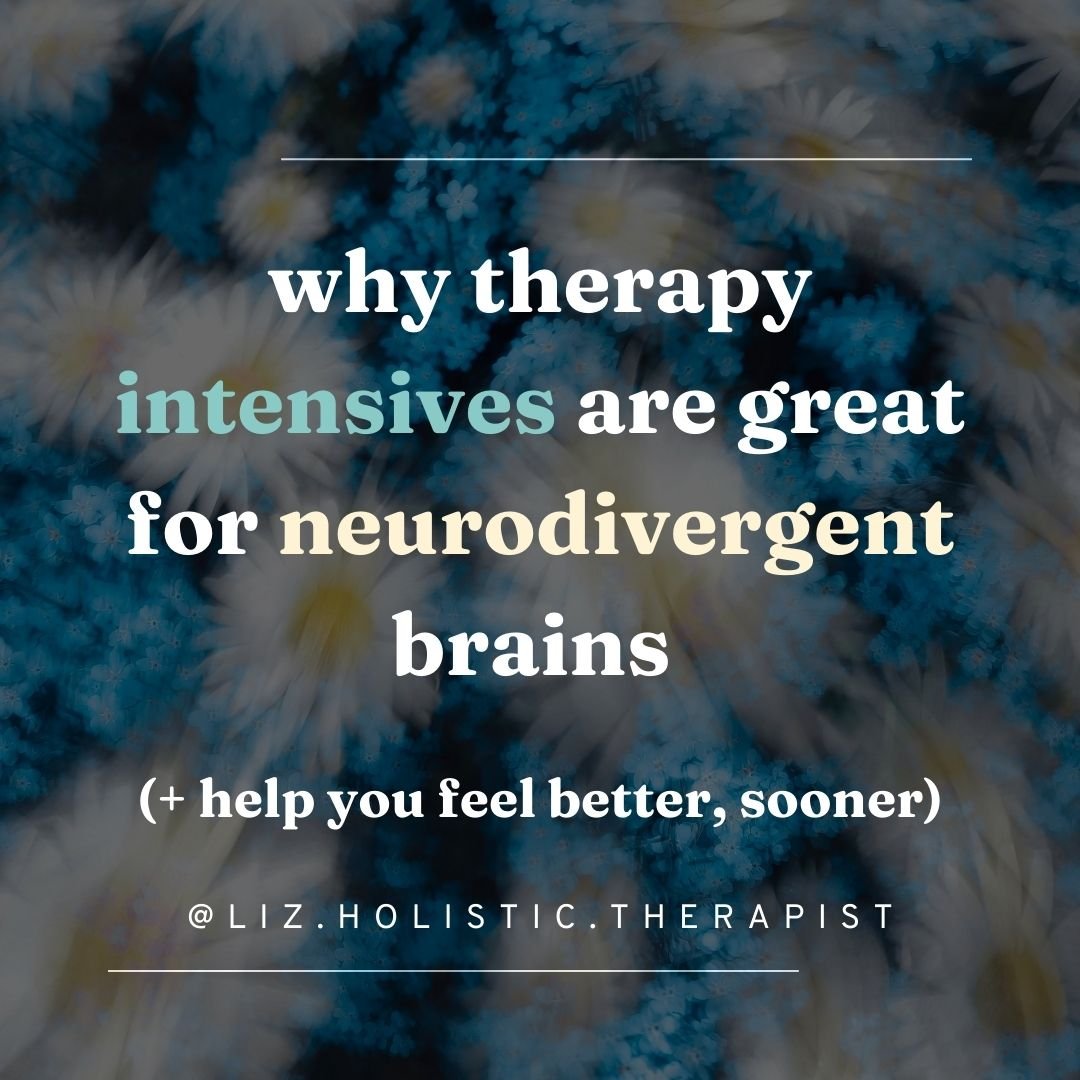Liz Zhou
Holistic Trauma Therapist, Coach, Speaker
Helping highly sensitive, neurodivergent adults & couples.
BLOG
For Neurodivergent Adults: 6 Creative Ways to Regulate Your Nervous System
Many neurodivergent adults (autistic, ADHD, highly sensitive) experience emotional intensity, sensory overload, and social challenges that dysregulate their nervous systems. This blog post explores 6 unique ways ND folks can care for their nervous systems through sight, sound, taste, smell, touch, and the crucial practice of taking breaks from sensory input.
How Do I Know if I’m Neurodivergent? | The Umbrella of Neurodivergence
Explore the broad spectrum of neurodiversity, from innate neurodivergence like autism, ADHD, and high sensitivity; to acquired differences resulting from trauma and other experiences. We’ll explain why both formal diagnoses and self-diagnosis are valid; and why there is no such thing as a 100% neurotypical person.
EMDR vs. Brainspotting: Which is Better for Neurodivergent Brains?
EMDR and Brainspotting offer unique approaches to brain-body healing. Discover which therapy might be a better fit for you based on factors like structure, flexibility, and session frequency (weekly vs. intensive).
For Late-Diagnosed Autistic Adults: 3 Affirming Reminders on Your Unmasking Journey
You are not broken. Your goal doesn’t have to be to fully unmask all the time, if you don’t feel safe or ready to do so. And you don’t have to magically “know” yourself post-diagnosis/discovery of your autism.
Why Therapy Intensives are Great for Neurodivergent Brains
If you’re neurodivergent (autistic, ADHD, highly sensitive) and traditional therapy hasn’t quite worked for you, a therapy intensive could be a helpful alternative. Intensives are a form of short-term, accelerated therapy, using powerful modalities like Internal Family Systems, Brainspotting, and EMDR to heal the nervous system.
Healing Complex Trauma as a Neurodivergent Person
Let’s explore the 4 phases of CPTSD recovery. Here’s why you might feel worse before you feel better, and why you might feel more neurodivergent (more autistic, more ADHD) as you heal from complex trauma.
Unmasking Autism: 6 Common Experiences of Late-Diagnosed Autistic Women
Many women discover their autism later in life. This delayed diagnosis is often due to societal misconceptions, gender bias, and the tendency to mask autistic traits. Let’s explore the common experiences of women who’ve been labeled “quiet,” “shy,” “sensitive,” and “different.”
EMDR Therapy for Autistic Adults | A Neurodiversity-Affirming Perspective
Is EMDR therapy for autistic people different than EMDR for non-autistics? The answer is more complicated than you might think. An autistic therapist shares how neurotypes influence the way that we process trauma — and why EMDR can be a great fit for neurodivergent brains.
For Adult ADHDers: 3 Simple Ways to Improve Executive Functioning
Struggling to complete — or even start — your to-do list? The ADHD brain has a variable attention span, motivated by interests rather than by priorities. A neurodiversity-affirming therapist explains how to stay focused and get things done — even the tasks that you dread doing.
Double Empathy Problem: Why Communication is Confusing in Neurodiverse (Autistic-Allistic) Relationships
In mixed-neurotype relationships, communication breakdowns can occur due to differences in brain processing styles. A neurodivergent-affirming therapist explains how the “Double Empathy Problem” shows up: direct vs. indirect language, verbal vs. nonverbal communication, and differences in eye contact.
What is Neurodiversity-Affirming IFS Therapy?
Learn why Internal Family Systems therapy can be a great fit for neurodivergent people (Autistic, ADHD, HSP) seeking to heal trauma, unmask, and connect with their authentic selves. A neurodivergent therapist explains how IFS works.
“Autistic Person” vs “Person with Autism”: What’s the Difference? | A Neurodivergent Therapist’s POV
As the mental health field updates its understanding of autism to be more affirming, more and more adults are realizing that they’re autistic – leading to a growing community of late-diagnosed neurodivergent people. Let’s explore the difference between identity-first and person-first language, and why many members of the Autistic community prefer identity-first language.
The Link Between Trauma and Neurodivergence
There’s a reason why autistic, ADHD, and other neurodivergent people tend to experience higher rates of anxiety, depression, PTSD, and complex trauma. Let’s explore how stigma, misunderstanding, and lack of accommodations in our neurotypical society impact mental health — and what we can do about it.
Why Talk Therapy Isn’t (Always) Helpful for Neurodivergent People (+ What to Try Instead)
Let’s face it: traditional talk therapy wasn’t designed with neurodivergent brains in mind (autism, ADHD, high sensitivity). If you’re feeling stuck or unheard, consider alternative approaches like EMDR, IFS, and psychedelic therapy.
6 Objects That’ll Make Your Life Easier as a Highly Sensitive, Neurodivergent Person
Sensory overload is a common challenge for highly sensitive and neurodivergent nervous systems. Discover how a few simple tools, from noise-canceling headphones to fidget toys, can create a calmer and more comfortable world for you.
Common Challenges of Neurodiverse Couples (+ Tips to Improve Communication and Intimacy)
Is miscommunication causing tension in your relationship? Do you get into arguments over thermostat settings, noise levels, and lighting in the house? Learn how the “double empathy problem” and differing sensory needs impact neurodiverse relationships (autistic/allistic, neurodivergent/neurotypical). A neurodiversity-affirming couples therapist offers 4 tips.
















